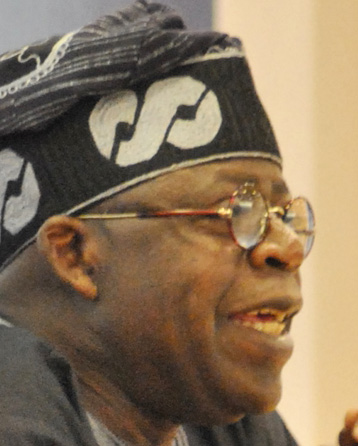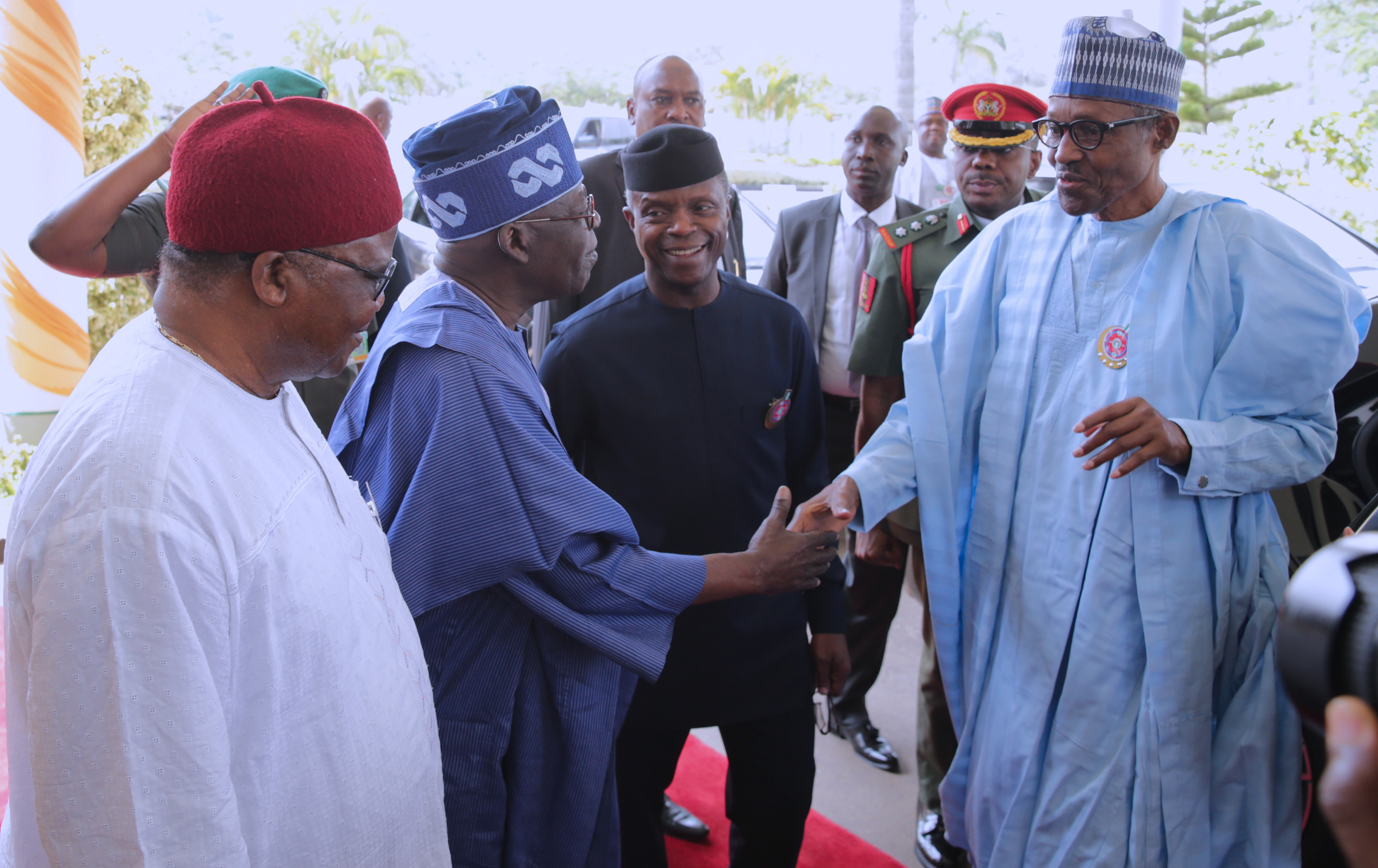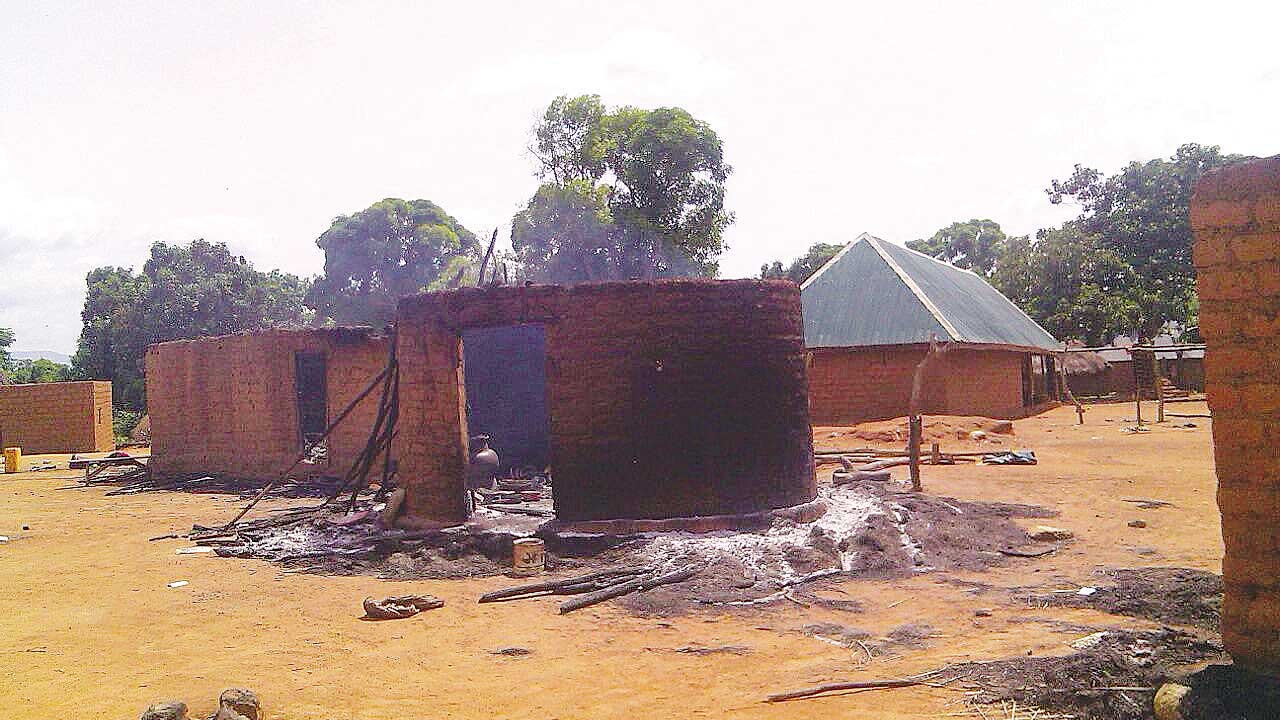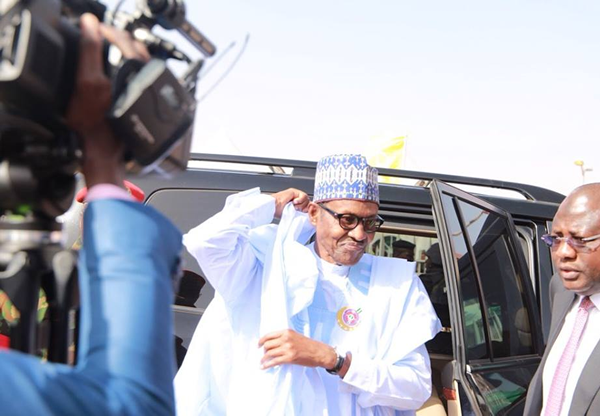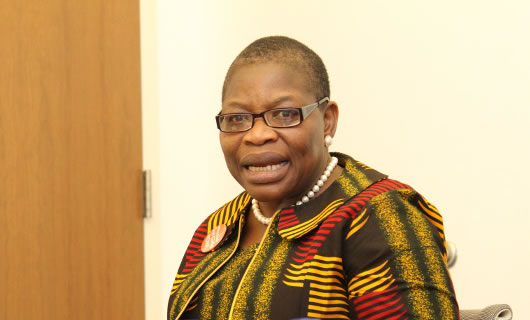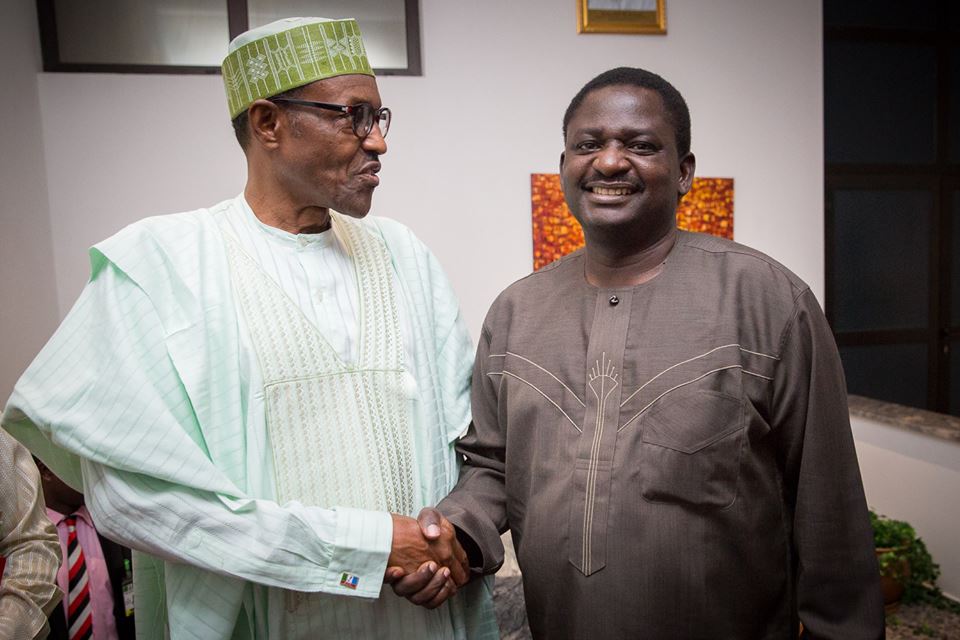PRESIDENT BUHARI PRESENTS BOOK BY PRESIDENTIAL MEDIA TEAM 000;ON ARRIVAL R-L; President Buhari, Vice President Yemi Osinbajo, APC Chieftain and Former Lagos State governor Asiwaju Senator Ahmed Bola Tinubu and Former Minister of Information, Prince Tony Momoh during the presentation of a book by Presidential MEDIA Team at the State House. PHOTO; SUNDAY AGHAEZE/STATE HOUSE IN Abuja. NOV 16 2017.
The mouths of babes speak truths that the hoary and the wise dare not utter. This may be an unusual way to begin an address on the political challenges that lie before us. But I have good reason for this unique entrance.
Before I provide that reason, permit me to commend the Daily Trust for having the foresight to inaugurate this important event 15 years ago.
This dialogue has enriched our democratic discourse. As such, it has served us all well no matter one’s partisan stripe or political affiliations.
More profoundly, the Daily Trust has established itself as a pillar of journalism. It has become a well-respected, widely read newspaper, an objective platform for the exchange of views regarding the evolution of our country.
Advertisement
I thank the Daily Trust for the honor of addressing this important gathering at such a national moment, freighted with such consequence.
I must add a caveat at this point. I do not stand here in my partisan garb. The partisan moment will soon come and I will actively engage in it when it does.
But that moment is not now. Today, I speak to you as your compatriot, a man who seeks the best for his family, community and nation. I am not here to contend with anyone. I am here that we may better understand one another.
Advertisement
“From the mouths of babes…….”
I repeat this phrase because of a talk with some young children a few weeks ago.
One of the children raised his voice, saying the old people’s game will soon start. The statement puzzled me as I could not guess the sport he meant.
I was taken even more off guard when he answered my subsequent question by exclaiming: “politics.”
Advertisement
The young boy described how politics seemed but a game. He explained that people joined parties which were nothing more than teams.
Partisans dress in funny clothes with peculiar symbols on them, carry banners at big rallies in stadiums just like fans at a football match. And politicians always boasting that the contest will be tough but they will beat the other side just like opposing footballers do.
He concluded the only difference was victory in sports was measured by goals scored while in politics it was defined by votes gained.
Initially, I was amused by the boy’s observations. I tried to explain the differences between politics and games. Yet after the children left, I pondered his observations in earnest. It hit me that his comparison was more accurate than I dared admit.
Advertisement
Too many of us for too long have treated politics as a game open only to an elite, exclusive club of players. The nation and the people constituted the pitch upon which the game would be decided.
This incorrect mindset has misshaped our politics and injured the nation in ways mundane and profound.
Advertisement
Approaching nearly 60 years of independence, Nigeria remains a complex yet incomplete work of art, a project as much on the drawing board as it is our daily reality.
For too many, Nigeria itself is a game. They are not wedded to the idea and ideals of Nigeria as a diverse and democratic but unified nation.
Advertisement
They see the nation not as object of loyalty but as the most available platform to realize their personal aims. In their minds, Nigeria is lesser than their ever expanding ambitions. Because they view Nigeria as a game, their politics is but a game within a game.
Instead of being a joyous nation, we have become a cruel playground where the fears and concerns of the average person get exploited but their interests never get promoted.
Advertisement
While democratic politics inherently bear aspects of competition and contest, it must never be reduced to a mere game.
The objective of a game is served by the mere playing of it. Playing the game is an end in and of itself. However, this cannot be the case with politics and elections.
Winning the political contest can never be an end in itself.
The proper outcome of electoral victory is not for the victor to revel at his good fortune or his skill in electioneering. The inevitable sequel to an election is for the winner to assume the sobering burden of governance.
Elections are not the climax of an epic book. They are merely the close of the book’s opening chapter.
What comes afterwards – governance — is much more vital than politics, for governance determines how we shall live.
Whether we shall inhabit the lush fields of growth and prosperity, or the thorny bog of despair,
Whether we join in unison to overcome common social and economic afflictions or allow those afflictions to set us against each other in a ceaseless barrage of recrimination and animosity,
Whether we stand for justice and fairness for every Nigerian or stand for nothing at all, the quality of governance will determine these important things.
Politics determines governance and governance defines the life we lead. Thus, politics can never be a game. It is a link in that vital process that spins either toward progress or toward the accumulation of problems and their dire consequences.
In this regard, 2015 was a watershed year. People jettisoned the political game as usual. They rejected worn political affiliations and superficial loyalties for a chance at substantive change.
The people realized the political game had theretofore been played against rather than for them.
Prejudiced notions of all kinds were cast aside. Inducements that had enticed people before did not work that time. The people voted to better Nigeria.
Yet we must acknowledge that cynical politics as a game had been played, so long that it has become institutionalized.
The bad game permeates every institution of the political economy.
Ridding the nation of this rot is not a game. It is tantamount to moral as well as political warfare. Thus, we must not play at it.
We must fight desperately as if the fate of the nation depends on the outcome. For our fate actually does depend on it.
The battle waged during one election cycle is not enough to win this war.
Curing the ills that plague our house will require many years of outstanding governance.
Thus, it is imperative that we not allow politics as usual to claim the 2019 election season away from us.
We must insist on the principle that elections do not return to being games played by a well-heeled elite while the rest of the nation is left to struggle and starve.
The people must resist all appeals to unthinking passions and old prejudices. We must adhere to what our conscience reveals as the best path to good governance for all.
For me, that path has always been a progressive one that harks to the need to materially transform the power relationships upon which this political economy is based. Despite the progress made, too much political and economic power resides in the hands of too few. This results in a society described by too much unemployment, inadequate infrastructure, too little food, yet too much poverty.
For the debate needed on how best to tackle these structural problems, 2019 must not be a game between players similar in every way save the political party costume they wear.
The election to come must be a contest of different visions for the nation’s present and future.
As a progressive, I believe we must transform the nation by embarking on deep and impactful reforms, by creating more jobs, providing social policy initiatives and building an infrastructure befitting a leading nation. Social services must become a reality close at hand and not a vague dream lying in the distance.
For example, we must reform the current fuel subsidy regime. At this stage it causes more problems than it cures. Bottlenecks of long fuel queues, erratic supply, resultant economic dislocations for consumers from lack of fuel and the corrupt practices of trade insiders undermine the good intentions upon which the subsidy is based. Currently, the subsidy does not benefit the average person. It sweetly profits the elites who manipulate the program to their own advantage. We need to allow market forces to more directly determine price. We need to open the now closed market to more suppliers. In this way, we may better harmonise supply and demand, where they do the most sustainable economic good.
In addition, we must repair our social safety net. Old people who have given so much to the nation are being shortchanged and forced to live in penury when they should be living in the dignity due their advanced years and their former labors.
Mr. President won the 2015 election on a platform that included economic recovery, job creation and improved welfare for workers. In keeping with his promise, one of his first executive actions was to arrange federal funding of nearly N800b for states to pay salary arrears; also, the subsequent refund of over N800b of Paris Club excess payment came with a similar guidance to State Governors to prioritise salary arrears and payments.
These laudable initiatives notwithstanding, clearing of salary arrears is still not fully achieved although it has clearly taken on an importance not seen in prior governments. Meanwhile, the issue of longstanding mounting arrears of pension payments and retirement benefits to public sector workers remains outstanding. The total figure is estimated in trillions. This not only results in untold hardship for pensioners and their families, it denies the economy of needed stimulus and growth from the increased purchasing power resulting from payment of pensions.
In short, the progressive governance we seek will open the door to affordable housing for the average family, consumer credit for those with steady employment and the provision of basic welfare to our most vulnerable citizens.
Against progressive this vision, the other side, the conservative party among us, believes they can miraculously improve the nation by retaining the old ways that led us into the ditch in the first instance.
The past 3 years have captured the essence of our collective challenge. Progress has been made in part. However, advocates of the old ways have rebelled in full against even these partial blossoms of improvement.
Yet, I maintain the unshakeable belief that smart, progressive governance can bring prosperity, tranquility and justice.
During the past three years, this government has beaten Boko Haram into retreat. None of us should forget the looming threat Boko Haram posed and the fear it instilled in the general public just a brief time ago. It had planted its flag over Nigerian land, claiming territory bigger than several nations. It had kidnapped and killed at will, decimating towns and villages in its wake.
The dreaded terrorist flag is nowhere to be seen and steadily people are returning to their homes, rebuilding their towns and villages in the process. Boko Haram may not be completely defeated but it shall never rise again to be the existential threat it once was. Because of this government’s policy, countless lives have been saved from the grasp of terror.
In addition, this government has progressed in the fight against corruption through recovery of stolen public funds and bringing wrong-doers to justice.
As progress is being made on these fronts, Nigeria also must face its biggest structural problem: our imbalanced economy and the poverty and misery it has caused.
If a prophet, I would begin to prophesy at this point about all the good economic things that shall visit Nigeria and its people if we stay the proper course; in taking further bold action to reform and improve our political economy.
But a prophet I am not.
Yet, if you permit me the slight indulgence of considering myself, at least, a statesman in the making, may I then state unto you the issues this nation and those who govern it must address.
I would be remiss at this moment if I failed to mention the terrible killings that have occurred in Benue and Taraba states.
It is important that we place the current crisis in proper context. No one should pretend that this evil just suddenly appeared from nowhere. We have been living and dying with this lethal situation for many years.
In years past, there have been herdsmen attacks smaller than this. There also have been attacks larger than this.
The current hue and cry against these killings is hopefully a sign that we are maturing as a nation. That we shall no longer countenance the wanton destruction of human lives no matter the religion, ethnicity or origin of the victims or the villains. If so, maybe this nation is coming of age and none too soon.
As such, this outcry is as welcome as it is overdue. We should have been agitating in this manner 5, 10, 15 years ago. Lives would have been saved. For reasons I cannot completely fathom we have come late to the point of strong, collective outrage at this bloodletting. Yet, all in all, late is better than never in this regard.
This spirit of compassion and care must be enshrined in our political culture because it is integral to national greatness and democratic progress. True patriotism requires that you love more than the concept of Nigeria. You must love the people who comprise this nation, whether they worship in a church, mosque, and shrine or not at all.
Over the course of history, nations have faced crises more crimson than this. Through wise policy, many nations emerged from the thicket better situated to realize their better destiny.
These nations and their people are no better than us. We can and we must do the same thing.
Against this backdrop, we must take prudent action. It is incumbent on the federal government to do what past governments neglected to do. We must forget our age-old prejudices in order to resolve this problem. What we need is serious committed action.
At its essence, this crisis was not born of religious or ethnic hatred. It is about a shrinking amount of grass and water.
In recent years the desert has expanded, consuming land once used to graze livestock. This pushed cattle herders farther and farther south to collide with the farmers who were there.
Ecological peril spawned economic conflict which descended into violence.
This violence has taken on religious, ethnic and regional consequences because of the identities of the parties involved. This tragic episode tolls a caution to us all.
Left to fester, this problem expanded to assume dimensions that now tremors the body politic.
This is what too often happens when dire problems are left unattended. Now, the current administration is moving to arrest the lethal situation.
I welcome the deployment of more law enforcement and military into the troubled areas. These security measures will stem the immediate violence and loss of life.
As we commend these security measures, we must not lose sight of the fact that the problem bears an economic origin. Thus, agro-economic policy initiatives must help shape the lasting solution.
The crux of the matter is that the nomadic way of life is fast becoming obsolete. Large scale nomadic practice does not belong in this day and age. This is reality and it is inescapable.
Thus, herders have no right to cling to this way of life by killing others. Government must stop their violence but also offer them a viable new way of life by moving them toward more modern, non-nomadic cattle rearing.
Additionally, government should establish a relief and rehabilitation program for those families and communities that have been so grievously harmed.
In short, to resolve this lethal problem, government must implement a multi-dimensional policy that encompasses security, agro-economic, educational and emergency relief elements. This is the art and mastery of governance that our nation and its complex problems require.
In addition to mending this rupture of peace, I believe those who seek to enshrine good governance must boldly act to improve the quality of life of the people.
- We are a populous nation with large, ever-growing cities. We need to provide jobs for this expanding urban population.
This means we must press forward with a national industrial policy by fostering strategic industries that will provide employment into the foreseeable future.
- We need a national infrastructure plan that envisions a coherent and integrated infrastructural grid, as no national economy may grow beyond the capacity of the infrastructure that serves it. This particularly is true of electrical power.
- We must reject the notion of orthodox economics that governmental balancing of budgets or surpluses are always good. In our case, following this mainstream approach may lead to perpetual stagnation and deter us from the brave steps required to promote true development.
In this regard, an immediate opportunity to provide stimulus to the economy while simultaneously alleviating the hardship of retirees and old-age pensioners presents itself, through the comprehensive tackling of outstanding pension payments. While what is needed is a holistic review and reform of the disjointed social security and welfare apparatus, a good place to start would be the clearing up of existing pension arrears and the establishment of a framework for averting their future build-up. The wider task of comprehensive social security reform would inevitably require a high-level body to review and advise on the harmonization of various initiatives and deductions from workers’ payrolls in the name of welfare, such as pension contributions, national housing fund, national health insurance etc
- Monetary policy should move toward lower interest rates to make credit is more accessible to business and the consumer. This will spur industrial investment and help us reach more conducive levels of consumer demand. It also will dissuade people from corrupt temptations.
The need to pay for homes and other costly items in one lump sum payment is a strong invitation to corruption. For example, if mortgages and credit instruments are more available to the judiciary, jurists would be able to purchase homes, decent care and other items considered the basic amenities of modern life via long-term installment payments that can be met through their salaries. Able to purchase these things properly and thus afforded a comfortable life, jurists would be less vulnerable to improper inducements.
- The government-backed home mortgage system must be re-structured and land conveyance more streamlined make mortgages and all forms of landed transactions are easier and less bureaucratic. This will increase the wealth of the nation and improve the efficiency of land use. It also opens the door to affordable housing for millions of families now beyond the reach of owning their own homes.
- Agriculture remains the backbone of the nation. We must help the common farmer by improving rural output and incomes. Here, we must revive an old policy that served us well. We must return to commodity exchange boards which will allow farmers to secure good prices and hedge against loss. An agricultural mortgage loan corporation should be inaugurated to further promote these goals.
- To achieve better levels of overall governance, we need to re-balance the duties between federal and state governments by giving states more power, authority and resources.
- Last, Government must be sufficiently bold to begin a process that will ultimately result in a government-backed pension plan for all elderly Nigerians, this is something akin to Social Security which all great nations provide for those of advanced age.
CONCLUSION
The challenge we face leading into 2019 is not to fall backward in governance and development as we move forward in time. Reform and change are difficult because they are always and everywhere resisted by those who benefit from the old order.
But we must insist on a better life for our people. As such, the electoral politics of 2019 cannot be played as if a game that has no end other than itself. Here again, we must insist on politics having a nobler and larger goal than just registering certain people into the fraternity of officeholders.
People must not only aspire and hold office; they must seek to govern prudently from that office.
This is the challenge of 2019. Shall our elections be a game in and of itself or will it be a platform from which we continue to move toward the progressive, responsive governance Nigeria deserves.
I know the path I prefer. Because the next time I speak with a child, I would rather that it be that I can tell him more about the nature of our politics than can he tell me.
Being a speech delivered by Tinubu at the Annual Trust Dialogue in Abuja
Views expressed by contributors are strictly personal and not of TheCable.
Add a comment
